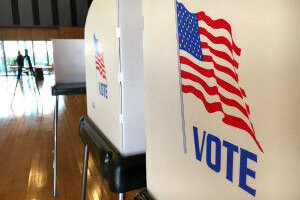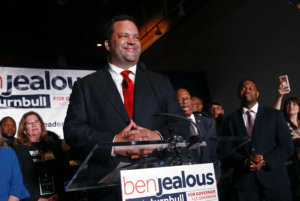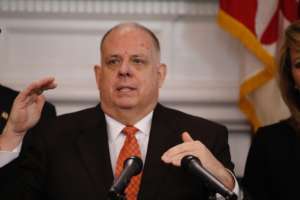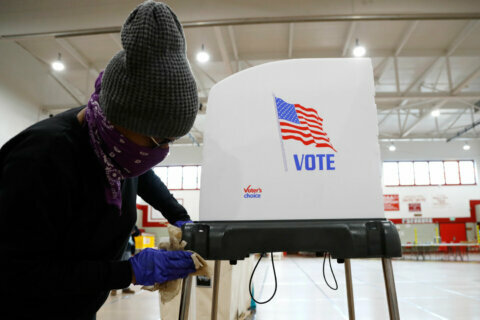
WASHINGTON — In a joint statement issued Thursday, the campaigns of Maryland Gov. Larry Hogan, the Republican incumbent, and Democratic challenger Ben Jealous announced that they’d agreed to square off on Sept. 24 in a one-hour debate that will be hosted, moderated and broadcast by Maryland Public Television.
But it turns out the debate itself is fast becoming a cause for debate. How did such a contentious competition whittle down to just having a single meeting? It turns out both campaigns have conflicting explanations.
The Hogan campaign insists that their side were willing to hold more than one debate. In an attempt to reinforce its claim, the campaign released emails exchanged between Hogan campaign manager Jim Barnett and Jealous campaign manager, Travis Tazelaar.

Their tone could be described as cordial, with the two campaign managers commiserating over the challenges of tight schedules and sweltering heat during the Labor Day parades, in which both men appeared.
“Brutal heat, I feel you,” Tazelaar wrote to Barnett, who later apologized for a slow reply by writing: “Sorry. Endless morning meetings.”
Emails from both sides mention agreeing to just one debate. But in a statement, the Jealous campaign blamed Hogan’s team for what it claimed were “the Hogan campaign’s unwillingness to engage in good-faith negotiations.”
“The governor very publicly accepted two debate invitations,” Barnett said, in a statement supplied by the Hogan campaign. “If the Jealous campaign wanted more than one debate, they could have taken ‘yes’ for an answer.”
Todd Eberly, a professor of political science at St Mary’s College of Maryland, said it’s very unusual to have just one debate for governor in Maryland.
“You have to go back to 2002, and Bob Erhlich and Kathleen Kennedy Townsend, to see where there was only one debate,” Eberly said, referring to former Gov. Bob Ehrlich, a Republican, and former Lt. Gov. Kathleen Kennedy Townsend, a Democrat.
Even then, Ehrlich and Townsend had a second joint appearance at a forum in Cambridge, Maryland. “It wasn’t technically a debate, but it was a second faceoff between them,” Eberly said.
While voters may tune out some coverage of political races, that’s not true of debates, Eberly said. “We’ve seen in the past, in Maryland, that gubernatorial debates have enjoyed pretty good ratings.”
“If you want to hear the candidates standing side by side answering the same set of questions, it’s incredibly beneficial,” to see the debates, he said.
Aside from the fact that the two camps have agreed to just one debate, Eberly said it’s unfortunate that the format is just one hour long.
“There’s not going to be a lot of time for any in-depth discussion. So voters really will be left with the candidates’ advertising, social media presence and what-have-you.”
Bottom line, said Eberly: “I think that’s a loss.”

Eberly said that in the lone matchup between the candidates, voters should “understand that often a candidate will go in there with prepackaged responses that they want to convey regardless of the questions asked.”
Eberly said that voters want candidates to drop the talking points, and they should watch to see if the candidates just give “canned responses” or actually answer the questions that the panelists ask.
Challengers typically want more debates than incumbents, and in this particular matchup, Jealous is at a disadvantage, Eberly said. “Jealous, I think, really needs these debates, and needs them sooner than later.”
Eberly remains surprised by the fact that there will be a single debate. “Those of us who study, those of us who teach Maryland politics, those who cover it, have all sort of pointed out that this is just not normal.”
The Sept. 24 debate will be taped at 11 a.m. at Maryland Public Television’s studios in Owings Mills, but it won’t be aired until 7 p.m. that night. Along with MPT, WBAL-TV in Baltimore and WJLA-TV in D.C. will carry the debate.






